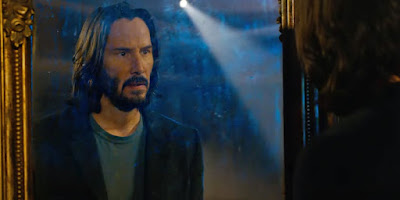Events in “Resurrections” pick up some sixty years after the conclusion of “Revolutions”, though Neo himself has only aged 20 years, narrative flim-flammery that mostly puts into perspective the leading man’s apparent agelessness. Not that Neo is happy. Where’s the drama in that?! No, Neo has become Thomas Anderson again, having more or less reverted back to where “The Matrix” began, emphasized in how the movie opens by essentially recreating the original’s opening. Thankfully this is not just a maudlin facsimile. Thomas is a video game developer who has created an ultra-successful game based on his memories from The Matrix itself, though he doesn’t understand these memories are real. In one scene Thomas meets with Warner Bros. marketing executives clamoring for a reboot of his “Matrix” game which devolves into a montage of marketing verbiage set to Jefferson Airplane’s acid trip anthem “White Rabbit.” And though this would seem on the surface a sonic commentary on the movie’s through the looking-glass sensation, Wachowski counters it by having Thomas pop blue pills at his therapist’s insistence, as if all this inside baseball engenders complacency and ignorance rather than setting your mind free.
And yet even if “The Matrix Resurrections” is taking direct aim at our ceaseless nostalgic cravings rather than challenging ourselves with something new, the fourth film falls back on old aesthetic tropes, a tendency to have its characters exist as nothing more than delivery devices for exposition, standing around and talking, and not with the thespian touch of “Dune” but in the bleary monotone of “Matrix” movies past, deadening so much of the brutal irony. And that is to say nothing of the action sequences, the majority of which feel perfunctory, a director uninspired to wage them waging them nonetheless, bringing little of the game-changing energy of “Matrix Reloaded.” On the other hand, there is something delightfully contradictory in how Wachowski refuses to let Neo graduate to the Neo of old. Struggling to get back into battle shape, he mostly takes it on the chin throughout hand-to-hand combat scenes and never quite emerges from this funk, a human flak jacket more than The One. But it’s not only that Wachowski is denying us these simple pleasures; she is also retrofitting the story to make it less about Neo than Trinity whose new name Tiffany evokes how she has become an everyday zombie going through the motions, unwittingly waiting on enlightenment.
This will sound strange, coming from a “Matrix” agnostic, who mostly was not moved by the Neo/Trinity relationship at the core of the original trilogy, but something here got me. I was reminded of watching the mediocre “The Rise of Skywalker” and how I teared up when I saw Han Solo, but realized my tears were coming from a place of cheap sentimentality, of what the character and those movies once meant to me but no longer do and how J.J. Abrams was merely exploiting it for modern purposes. In a sense, “The Matrix Resurrections” functions as criticism of that exact idea, suggesting the characters within its own movies have been blue pilled into being exploited for a similar purpose. That familiar but always strategic stone-faced air of Keanu Reeves, then, is matched by Carrie-Ann Moss’s similarly numbed countenance, playing two characters subsumed by a universe they no longer want a part of and from which they eventually break free. If Neo flying at the end of the first “Matrix” was a kind of pinnacle of his learned abilities, in “The Matrix Resurrections” it becomes their means of escape, flying through the air to fly away. I hope they never ever come back.





2 comments:
I'm not 100% sure if I'm reading a negative or a positive review here, surely a function of your mixed feelings but also an increasingly rare attribute I appreciate, which is letting the words speak for themselves in an era in which critics will usually come out and tell you exactly how they felt if their star rating did not make it obvious enough. I judged this to be the worst movie of the year, which probably only means it enraged me enough to have done something right and I should watch it again.
Thank you! That's generally how I like to write here, more as a working through than good/bad. I remember you citing it as your worst movie of the year and, honestly, if you already felt that way, I'm not sure a re-watch would be worth it.
Post a Comment